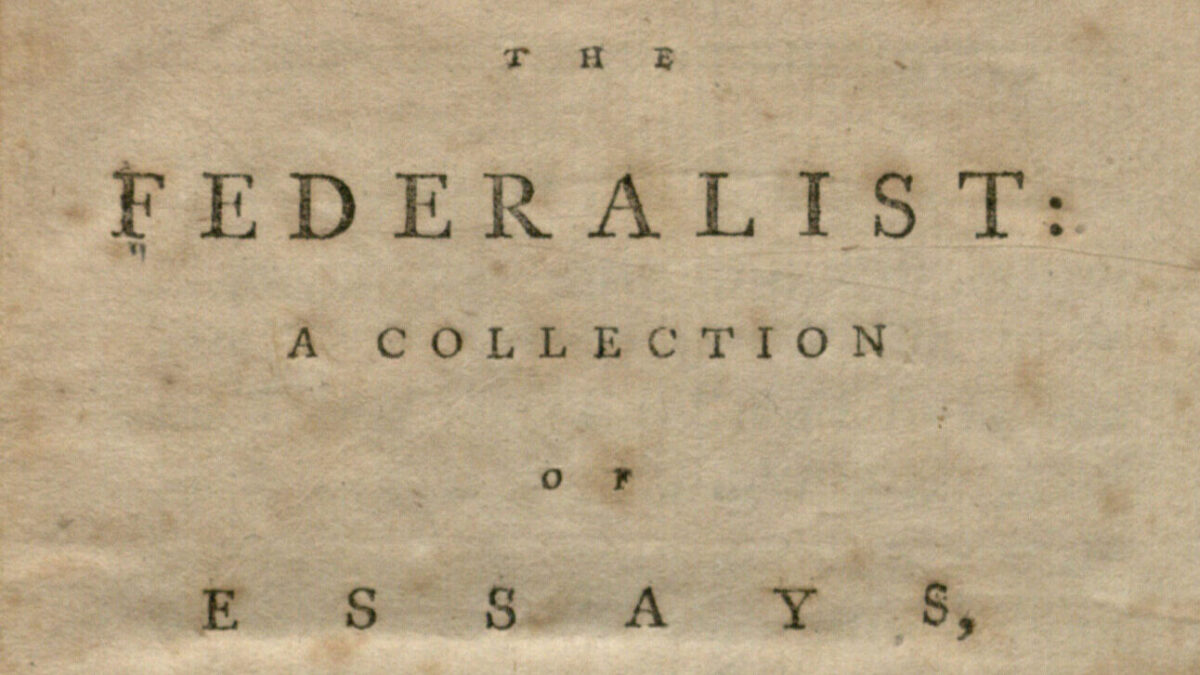
In the third lecture of Hillsdale College’s Constitution 101 course, (which you can take along with me here) professor Mickey Craig explains the genius behind the Constitution and The Federalist Papers.
How The Constitution Came To Be
Shortly after the colonists declared their independence from England, the United States found itself weakly governed by the Articles of Confederation and in a crippling amount of debt incurred during wartime. States refused to collect tax revenue and some created their own currency, resulting in financial chaos. Alexander Hamilton, James Madison, and John Jay advocated for a strong, centralized government in order to protect the Union and ensure that states pay their taxes and govern their citizens properly. But a faction of dissenters was worried that a centralized government would infringe upon states rights and argued that states should be split into separate confederacies
These Founding Fathers argued that one’s liberty and inherent rights are threatened when a government is too weak as well as when it’s too strong. These men wrote a series of essays in favor of forming a stronger national government which were published in newspapers at the time. These essays have been compiled and are known as The Federalist Papers.
In The Federalist papers, Hamilton addresses the practical concerns each confederacy would be faced with if they governed on their own. They would need their own armies and foreign policy and that this would force each confederacy to form entangling alliances — alliances that George Washington warned could topple the young republic in his Farewell Address.
’Tis our true policy to steer clear of permanent Alliances, with any portion of the foreign world. So far, I mean, as we are now at liberty to do it, for let me not be understood as capable of patronizing infidelity to existing engagements (I hold the maxim no less applicable to public than to private affairs, that honesty is always the best policy). I repeat it therefore, let those engagements be observed in their genuine sense. But in my opinion, it is unnecessary and would be unwise to extend them.
Tyranny And The Will Of The Majority
Anti-Federalists were concerned a centralized government would embolden the majority — that the majority would realize they could bend the entire republic to its will. As a result the will of the majority could eventually become a tyranny. But in Federalist 9, Hamilton explained that this was already happening in some states precisely because there wasn’t a strong national government to oversee each of the states. Previous republics in ancient times devolved quickly into tyranny and anarchy because there were numerous distractions, but that majority tyranny could be avoided due to the improvements in political science since ancient times.
Hamilton wrote that separation of powers, checks, and balances, and a strong, independent judiciary — which were included in the Constitution — would prevent a republic from devolving into tyranny. Through these measures, the Constitution accounted for human nature and for man’s thirst for ever-increasing power.
In Federalist 10, Madison says faction and partisanship are unavoidable aspects of liberty because men who are free will have different opinions and will disagree with one another. Eliminating faction altogether would be to eliminate liberty — a cure worse than the disease. He says the larger a republic, the broader scope of interests and factions can exist, which reduces the likelihood of any particular faction from getting to big and gaining too much power.
The Constitution requires virtuous men to be the ones serving as representatives — the best and the brightest who have the best interests of the country at heart must be the ones holding power. And that a larger republic expands the pool of talent and diversifies the interests — economic and otherwise — within the country. The wider range of interests reduces the likelihood of a faction to wield all the power.
The smaller the society, the fewer probably will be the distinct parties and interests composing it; the fewer the distinct parties and interests, the more frequently will a majority be found of the same party; and the smaller the number of individuals composing a majority, and the smaller the compass within which they are placed, the more easily will they concert and execute their plans of oppression. Extend the sphere and you take in a greater variety of parties and interests; you make it less probable that a majority of the whole will have a common motive to invade the rights of other citizens. . .
Making laws should not serve a faction, but the common good of the whole republic. Emboldening citizens to chose their own leaders — leaders who have the best interest of the Republic at heart — is what will keep the United States from devolving into the ill-fated democracies of ancient days.









